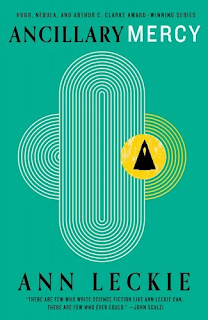Find a Review
Book reviews from Robin, co-host of the Books That Burn podcast. Bookshop links are affiliate links, we may receive a small commission if you purchase from our Bookshop. This content is CAN credentialed, which means you can report instances of harassment, abuse, or other harm on their hotline at (617) 249-4255, or on their website at creatoraccountabilitynetwork.org.
Featured
- Get link
- X
- Other Apps
Ancillary Mercy by Ann Leckie (Imperial Radch #3)
For a moment, things seemed to be under control for Breq, the soldier who used to be a warship. Then a search of Athoek Station's slums turns up someone who shouldn't exist, and a messenger from the mysterious Presger empire arrives, as does Breq's enemy, the divided and quite possibly insane Anaander Mianaai—ruler of an empire at war with itself.
Breq refuses to flee with her ship and crew, because that would leave the people of Athoek in terrible danger. The odds aren't good, but that's never stopped her before.
CONTRIBUTOR(S): Adjoa Andoh (Narrator)
PUBLISHER: Hachette Audio
YEAR: 2015
LENGTH: 330 pages (10 hours 53 minutes)
AGE: Adult
GENRE: Science Fiction
RECOMMENDED: Highly
Queer Rep Summary: N/A - The protagonist uses "she" for everyone, so anything I could say would be guessing.
ANCILLARY MERCY is an excellent conclusion to the Imperial Radch trilogy, with Breq solving a series of issues and helping out other people, but not framing her as some big damn hero able to fix every problem in the empire. She can't and she's not trying to do so. She can't fix the way that Anaander Mianaai is it war with herself, or the way that Breq doesn't know which Anaander Mianaai has which goal. This was an immensely satisfying ending, building on many things from the first two books, especially ANCILLARY SWORD, as this relates to Athoek Station pretty directly even though the previous book ended with them leaving the station.
ANCILLARY MERCY wraps up many details which were left hanging, almost everything I consciously noticed as being unresolved by the end of ANCILLARY SWORD gets handled in some way by ANCILLARY MERCY. There's an almost new story related to the Presger Empire, bringing in one of the most refreshing and delightful characters I've read in a long while. The translator is in a category all her own, and I would not expect any other of my favorite characters to compete with her. I found myself deeply relating to a lot of the ways that she expresses identity, especially for myself as a nonbinary trans person. There's a moment where someone asks whether she did a particular thing as a child and she replies something to the effect that she's never been a child, yes this body was a child at one point, but she wasn't the one in it at the time. I really like much of how she (and Breq) discuss identity. The Presger seemed to have something rather more suddenly shaped by names than any kind of directly human analog could encompass under most circumstances, but it reminds me of other transgender people I know for whom choosing a new name allowed them to embrace a new self in a way that hasn't been part of my own transition. I also like Breq's change in understanding about Ship, and the implications this has for all the various beings that the Radch constructed and consider to be tools.
This would not be a good place for a new reader to start, as it's the conclusion of a trilogy, but much of the story could make sense to someone who persisted in doing so. It's excellent from start to finish, though it greatly benefits from the context and characterization of the first two books in order to let the reader fully appreciate the more unusual ways that they get into conversations of identity.
The whole trilogy is great and I'm very happy with ANCILLARY MERCY as the conclusion.
Graphic/Explicit CW for colonization.
Moderate CW for grief, misgendering, violence, injury detail, medical content, medical trauma, police brutality, war, death.
Minor CW for gun violence, murder.
- Get link
- X
- Other Apps
Popular Posts
The Rise and Fall of Snow: Why the Hunger Games prequel is good, actually
- Get link
- X
- Other Apps
When Miserable People Get Happy Endings: "Unlikeable" Protagonists in Alexis Hall's Writing
- Get link
- X
- Other Apps

Comments
Post a Comment